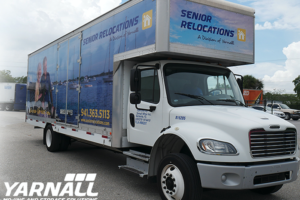Making a Smooth Senior Relocation

For senior citizens making a housing change and/or the loved ones helping them do so, a range of emotions are bound to arise. Perhaps the worst – and least productive – of these is the feeling of being totally overwhelmed, not knowing where or how to start, and rendered nearly immobile by the sheer enormity of the task.
The first and best advice we can give is to start thinking, and planning, well in advance. Even if it’s just allocating valuables or noting essentials, as Mary Poppins would say (quoting Aristotle): “Well begun is half done.” With an eye to the future, such integral progress can create a sense of accomplishment, while steadily putting more tasks behind you than in front of you.
Many of you likely know that we offer “soup-to-nuts” senior relocations, from helping with and facilitating the decision making of downsizing to putting the last of the utensils in the drawer. While this has been a boon for many of the seniors we’ve helped relocate, we know there are other individuals and families who want to take on some of that workload themselves.
With that in mind, this month’s newsletter is targeted at those hands-on folks, offering a few things to think about and incorporate in a senior moving plan. We hope these tips help and encourage you to call us if you have questions about navigating this unique situation.
We know emotions can run high in these types of moves and we’re here to help or just advise. We’re your neighbors, after all.
Not everyone downsizes in retirement. Some build their dream homes with everything they’ve ever wanted inside, and others require guest rooms for their children and their growing families. Most often, however, later-in-life moves are to smaller homes or facilities, situations in which just throwing everything in the truck and worrying about it later just doesn’t work.
For the majority who fall in the latter category, here are a few suggestions for them and those helping them.
- Get Serious About Sorting. Organizing experts recommend that accumulated belongings be sorted into what you plan to Keep, Sell, Gift or Throw Away (in that order, if possible). Some include a category for Store, but our experience has shown that a storage unit can be a safety net for some and an added cost devoted to housing things they’ll never use. In this process, there’s no room for “maybe.”
Accept Your Restrictions. Even if you’re fit as the proverbial fiddle, there are things you shouldn’t do when packing up your belongings. Take it slow and don’t overdo. Mix light and heavy items in boxes to reach a weight you can safely handle. Beware the book box, especially; though small, it can weigh up to 40 pounds when full of hard-backs, while looking deceptively easy to cart.
- Handle with Care. If you have fragile items to which you are attached, wrap them and rewrap them to get them to your next home intact. This will avert the disappointment of having a prized possession arrive unusable.
- The Last Shall Be First. The last couple of boxes in the truck should be the essentials to living in your new home for a few days. This takes some of the move-in pressure off and enables you to think a little more about your unpackaging strategy now that you’ve arrived in your new home.
- Take Care of Yourself. Be careful doing physical tasks and be sure to eat well and remain hydrated. Also, be prepared for emotions that could arise, whether it’s sadness at leaving behind a long-term part of your life or excitement that makes you want to accelerate what should be a steady pace.
- Put Yourself in Good Hands. Odds are that at least part of the move will have to be done by professionals. But how do you choose the one that’s right for you or your loved one? Here’s a good starting point:
- Make sure the company is licensed and experienced.
- Check reviews online and get recommendations from family, friends and trusted professionals.
- Get them to come to you for a complimentary consultation.
- Ensure they can provide an estimated analysis of all fees up front.
- Ensure the company’s employees are adequately covered for any injuries that might occur during the relocation process.
At Yarnall, we can assure you that our employees and contractors will treat you with courtesy, compassion and respect. We know the emotional toll that relocation can take on anyone, much less someone starting a new stage in life later in life and their loved ones who help in the transition. We can’t tell you how to feel, but we can hope that a smooth move sets the stage for anticipation and optimism for what’s to come.




Leave a Reply